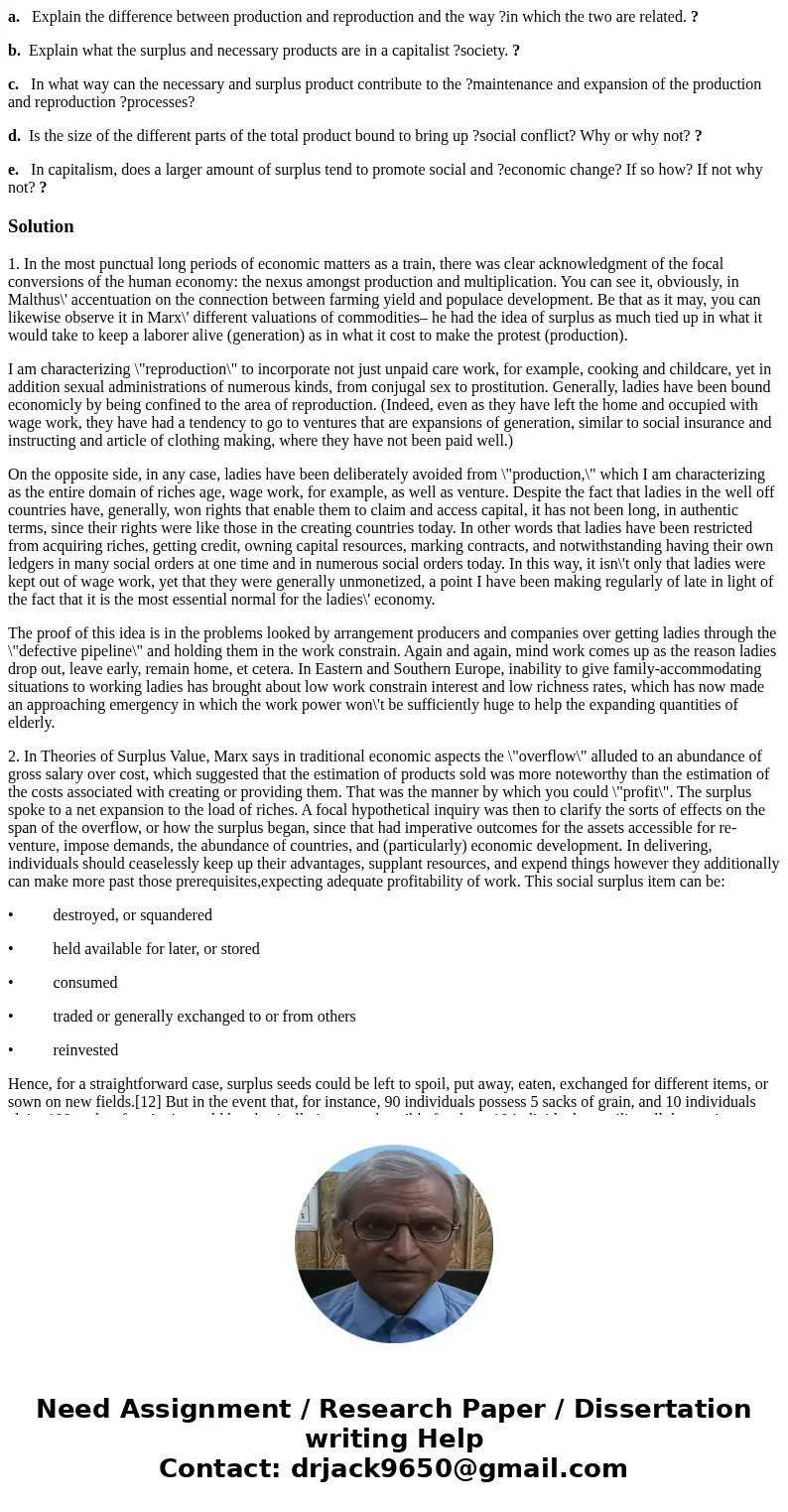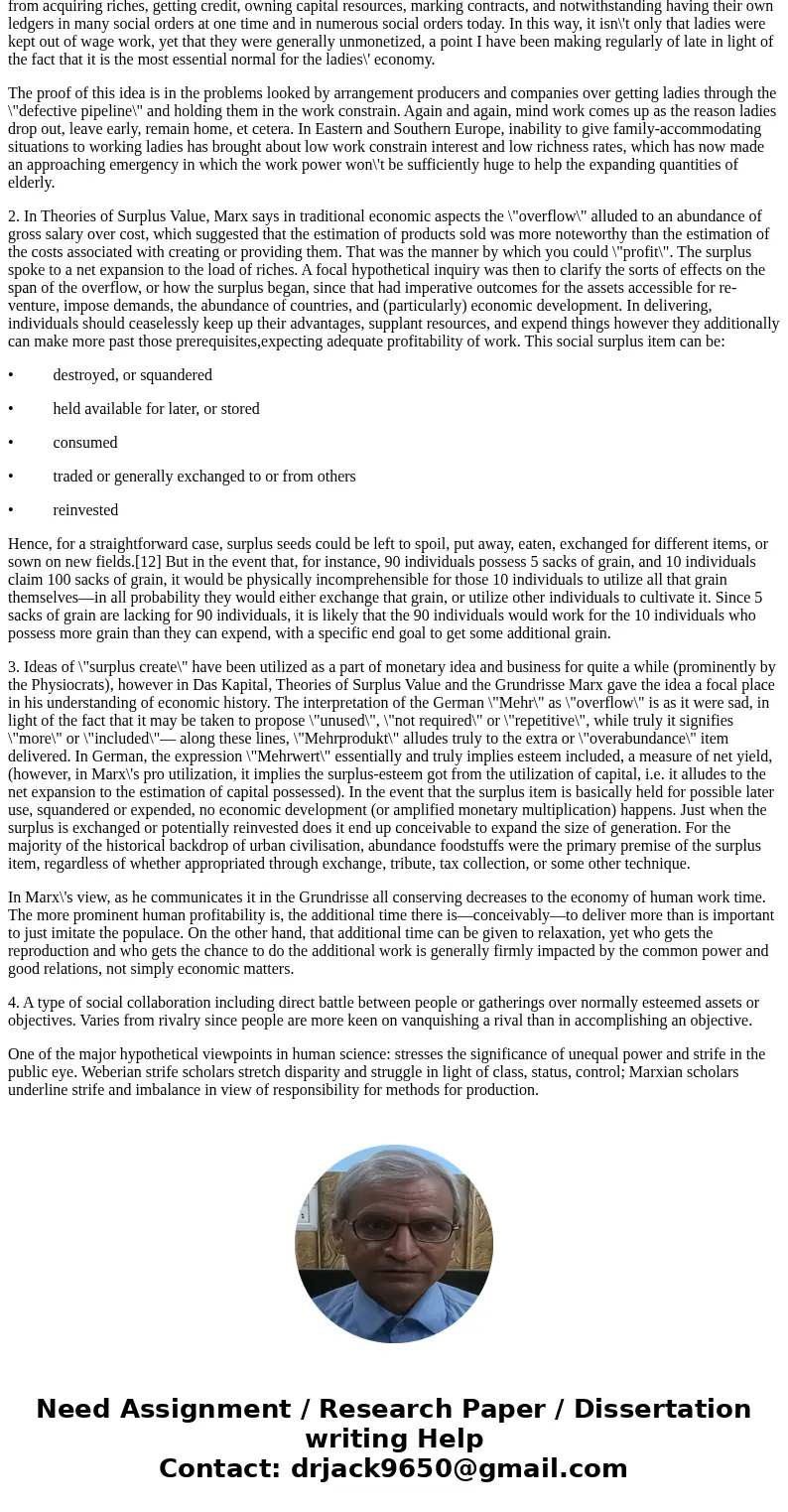a Explain the difference between production and reproduction
a. Explain the difference between production and reproduction and the way ?in which the two are related. ?
b. Explain what the surplus and necessary products are in a capitalist ?society. ?
c. In what way can the necessary and surplus product contribute to the ?maintenance and expansion of the production and reproduction ?processes?
d. Is the size of the different parts of the total product bound to bring up ?social conflict? Why or why not? ?
e. In capitalism, does a larger amount of surplus tend to promote social and ?economic change? If so how? If not why not? ?
Solution
1. In the most punctual long periods of economic matters as a train, there was clear acknowledgment of the focal conversions of the human economy: the nexus amongst production and multiplication. You can see it, obviously, in Malthus\' accentuation on the connection between farming yield and populace development. Be that as it may, you can likewise observe it in Marx\' different valuations of commodities– he had the idea of surplus as much tied up in what it would take to keep a laborer alive (generation) as in what it cost to make the protest (production).
I am characterizing \"reproduction\" to incorporate not just unpaid care work, for example, cooking and childcare, yet in addition sexual administrations of numerous kinds, from conjugal sex to prostitution. Generally, ladies have been bound economicly by being confined to the area of reproduction. (Indeed, even as they have left the home and occupied with wage work, they have had a tendency to go to ventures that are expansions of generation, similar to social insurance and instructing and article of clothing making, where they have not been paid well.)
On the opposite side, in any case, ladies have been deliberately avoided from \"production,\" which I am characterizing as the entire domain of riches age, wage work, for example, as well as venture. Despite the fact that ladies in the well off countries have, generally, won rights that enable them to claim and access capital, it has not been long, in authentic terms, since their rights were like those in the creating countries today. In other words that ladies have been restricted from acquiring riches, getting credit, owning capital resources, marking contracts, and notwithstanding having their own ledgers in many social orders at one time and in numerous social orders today. In this way, it isn\'t only that ladies were kept out of wage work, yet that they were generally unmonetized, a point I have been making regularly of late in light of the fact that it is the most essential normal for the ladies\' economy.
The proof of this idea is in the problems looked by arrangement producers and companies over getting ladies through the \"defective pipeline\" and holding them in the work constrain. Again and again, mind work comes up as the reason ladies drop out, leave early, remain home, et cetera. In Eastern and Southern Europe, inability to give family-accommodating situations to working ladies has brought about low work constrain interest and low richness rates, which has now made an approaching emergency in which the work power won\'t be sufficiently huge to help the expanding quantities of elderly.
2. In Theories of Surplus Value, Marx says in traditional economic aspects the \"overflow\" alluded to an abundance of gross salary over cost, which suggested that the estimation of products sold was more noteworthy than the estimation of the costs associated with creating or providing them. That was the manner by which you could \"profit\". The surplus spoke to a net expansion to the load of riches. A focal hypothetical inquiry was then to clarify the sorts of effects on the span of the overflow, or how the surplus began, since that had imperative outcomes for the assets accessible for re-venture, impose demands, the abundance of countries, and (particularly) economic development. In delivering, individuals should ceaselessly keep up their advantages, supplant resources, and expend things however they additionally can make more past those prerequisites,expecting adequate profitability of work. This social surplus item can be:
• destroyed, or squandered
• held available for later, or stored
• consumed
• traded or generally exchanged to or from others
• reinvested
Hence, for a straightforward case, surplus seeds could be left to spoil, put away, eaten, exchanged for different items, or sown on new fields.[12] But in the event that, for instance, 90 individuals possess 5 sacks of grain, and 10 individuals claim 100 sacks of grain, it would be physically incomprehensible for those 10 individuals to utilize all that grain themselves—in all probability they would either exchange that grain, or utilize other individuals to cultivate it. Since 5 sacks of grain are lacking for 90 individuals, it is likely that the 90 individuals would work for the 10 individuals who possess more grain than they can expend, with a specific end goal to get some additional grain.
3. Ideas of \"surplus create\" have been utilized as a part of monetary idea and business for quite a while (prominently by the Physiocrats), however in Das Kapital, Theories of Surplus Value and the Grundrisse Marx gave the idea a focal place in his understanding of economic history. The interpretation of the German \"Mehr\" as \"overflow\" is as it were sad, in light of the fact that it may be taken to propose \"unused\", \"not required\" or \"repetitive\", while truly it signifies \"more\" or \"included\"— along these lines, \"Mehrprodukt\" alludes truly to the extra or \"overabundance\" item delivered. In German, the expression \"Mehrwert\" essentially and truly implies esteem included, a measure of net yield, (however, in Marx\'s pro utilization, it implies the surplus-esteem got from the utilization of capital, i.e. it alludes to the net expansion to the estimation of capital possessed). In the event that the surplus item is basically held for possible later use, squandered or expended, no economic development (or amplified monetary multiplication) happens. Just when the surplus is exchanged or potentially reinvested does it end up conceivable to expand the size of generation. For the majority of the historical backdrop of urban civilisation, abundance foodstuffs were the primary premise of the surplus item, regardless of whether appropriated through exchange, tribute, tax collection, or some other technique.
In Marx\'s view, as he communicates it in the Grundrisse all conserving decreases to the economy of human work time. The more prominent human profitability is, the additional time there is—conceivably—to deliver more than is important to just imitate the populace. On the other hand, that additional time can be given to relaxation, yet who gets the reproduction and who gets the chance to do the additional work is generally firmly impacted by the common power and good relations, not simply economic matters.
4. A type of social collaboration including direct battle between people or gatherings over normally esteemed assets or objectives. Varies from rivalry since people are more keen on vanquishing a rival than in accomplishing an objective.
One of the major hypothetical viewpoints in human science: stresses the significance of unequal power and strife in the public eye. Weberian strife scholars stretch disparity and struggle in light of class, status, control; Marxian scholars underline strife and imbalance in view of responsibility for methods for production.


 Homework Sourse
Homework Sourse